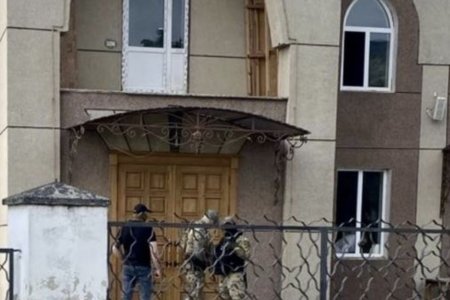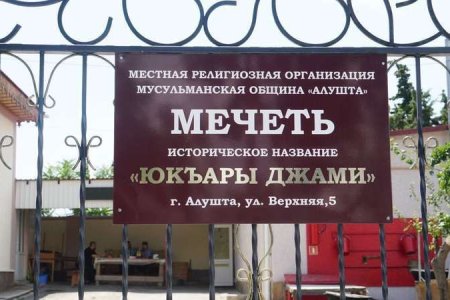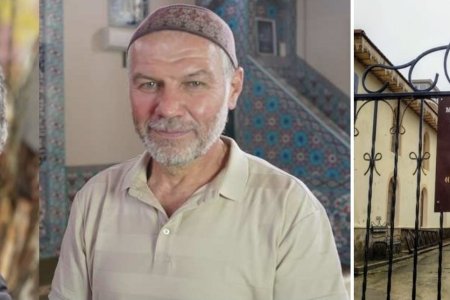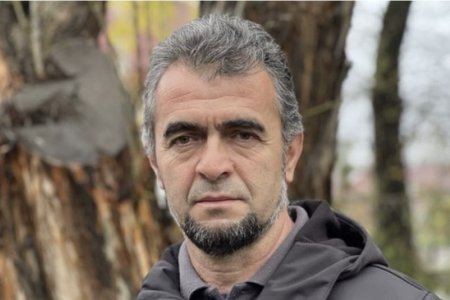
A Crimean occupation ‘court’ has imposed a massive 400 thousand rouble fine against the independent Muslim community Eski Qirim despite clear evidence that the supposedly ‘extremist’ literature ‘found’ in the mosque was planted by representatives of Russia’s so-called ‘centre for combating extremism; Such an evidently fabricated charge has now been used to justify a fine so prohibitively high that it may place the future of the community in jeopardy, with this very likely the intention.
The latest attack on Eski Qirim [Stary Krym, or Old Crimea] began with a visitation by Russian ‘enforcement officers’ at the Zubeir-Dzhami Mosque on 5 June 2025. On 11 June, the Head of the community Idris Yurdamov, told Crimean Solidarity that he had been handed a document claiming that, as a result of the supposed ‘check’ carried out on 5 June, “elements had been discovered of the offence under Article 20.29 of Russia’s code of administrative offences, namely ‘the production and circulation of extremist literature’. This had been signed by the notorious head of the ‘anti-extremism centre’, Ruslan Shambazov.
The ‘hearing’ over this charge took place on 8 July before the occupation ‘Kirovske district court’. Nazim Sheikhmambet, who represented the Eski Qirim community, pointed out to the ‘court’ that the video demonstrated that the officers had entered the mosque at 6.50 a.m., ten minutes before the stated beginning of the so-called ‘search and operation measure at 7 a.m. He explained to Crimean Solidarity that you can see on the video how the officers walking into the mosque turned off the electricity supply. One of the men entered the hall and can then be seen gesturing at something to a second officer. They then left the mosque and invited the participants of the ‘search and operation measure’, including members of the public and of the mosque in, now claiming to have ‘found’ prohibited books. Sheikhambet stresses that this is a flagrant infringement of the rules on such operations, and the protocol drawn up is, therefore, inadmissible.
This, however, was dismissed by the ‘court’, with it claimed that you could not confirm the time that the measure was carried out in the mosque.
It should be said that a substantial number of the politically motivated ‘trials’ in occupied Crimea or before Russia’s Southern District Military Court in Rostov involve ‘prohibited literature’, or even grenades claimed to have been found during ‘searches’ carried out with total disregard for rules in such cases. The FSB are, unfortunately, correct in assuming that they can get away with using such methods, with ‘courts’ invariably ignoring clear evidence of fabrication.
In this case, the occupation ‘court’ had two grounds for throwing out the prosecution. As Sheihambet pointed out, the Eski Qirim community are not the owner of the Zubeir-Dzhami Mosque. They cannot, therefore, bear responsibility for something found, or planted, in the mosque.
Sheikhambet reports also that the ‘case’ material includes statements from two employees of the Directorate of Muslims of Crimea which, under Mufti Emirali Ablayev has collaborated with the Russian occupation regime. They claim that members of Eski Qirim are blocking the work of the muftiate on the territory of the mosque. In fact, he points out, the mosque does not, currently, have its own official imam, and the term used in the protocol, namely “de facto use” is not a legal term. You cannot claim on the basis of these assertions that a religious community registered at a different address was responsible for ensuring that the law was observed in the mosque, i.e. that no ‘prohibited literature’ was present.
All of this was, typically, ignored by the ‘court’ which used the fact that the community had already faced administrative prosecution to justify the huge fine.
On 29 February 2024, ‘searches’ were carried out at the homes of the Eski Qirim Imam Izet Saifullin and of Idris Yurdamov. Yurdamov was released, however Saifullin was charged with ‘illegal missionary activities’, one of the extraordinary charges that Russia has applied against Imams leading worship in their own mosque and chosen by their community.
In March 2024, the same ‘centre for countering extremism’ brought administrative charges against Eski Qirim for supposedly holding ‘prohibited literature’. Yurdamov stated clearly then too that he had no idea how the books had appeared there. At the end of March 2024, the occupation ‘Kirovske district court’ fined Eski Qirim 100 thousand roubles over the charge, with that ruling later upheld by the occupation ‘high court’.



